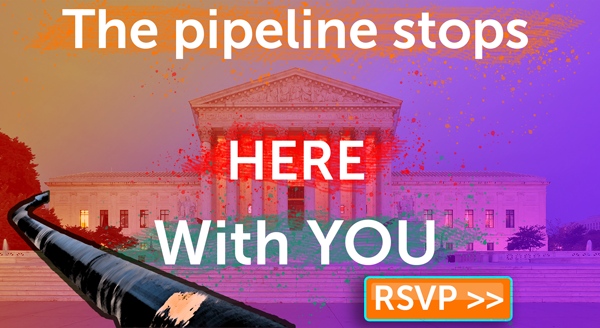On Feb 24, the U.S. Supreme Court will hear oral arguments in a case to determine if the Atlantic Coast Pipeline (ACP) can cross the Appalachian trail. This is the first time the Supreme Court has heard a case about a pipeline in years. And the first chance in years to put a meaningful check on the power of pipelines and the fossil fuel industry.
Nor is this likely to be the last case the court hears on pipeline siting – other rulings striking down an ACP Compressor station and several other cases are moving through the courts challenge pipeline companies’ right to claim a ‘public necessity’ to take private land through eminent domain and degrade public benefits like health and climate.

While the legal teams for the Southern Environmental Law Center (SELC) and the Sierra Club make their case to the Justices inside the courtroom, we will demonstrate that a majority of the public outside the court wants a check on the power of fossil fuel and pipeline companies.
It is the responsibility of the Court to hold the interest of citizens in balance with the Executive and Legislative Branches of government. With the undue influence that fossil fuel and pipeline companies have currently, it is critical that we unify our movement through escalated action against all pipelines and to let our position be known.
Click here to RSVP and join us on the morning of February 24 at the Supreme Court.
A lot of details are To Be Determined, but this we know:
- The Atlantic Coast Pipeline is an environmental and human rights disaster.
- If built, the ACP would generate more than 67 million metric tons of global warming pollution each year — the equivalent of 20 coal plants.
- It would require 38 miles of mountaintop removal and damage thousands of acres of farm and forest land.
- What’s more, the ACP would disproportionately harm poor, African-American and Indigenous communities all along the route. The plan includes building an enormous fracked gas compressor stations in Union Hill — an African-American community of great historical and cultural significance in Virginia — and thirty thousand Native peoples live in the project area across North Carolina.
- To demonstrate the seriousness of this issue, and our resolve to stop the ACP and all climate-wrecking pipelines, many of us are prepared to risk arrest at this event.
- We will do nothing that is violent and nothing to disrupt the oral arguments, which we want to proceed and hope to win along with allies in Virginia and West Virginia who brought the case.
There will be roles and responsibilities for all who want them, just like there always are in our movement. To make it possible for as many people to participate as possible, we’ll host a communal breakfast, prayer vigil, and briefing on Monday February 24 for those who are able to join.
We also welcome your participation with shared travel, housing and other arrangements. Let us know on the form if you need assistance or are interested in helping.
